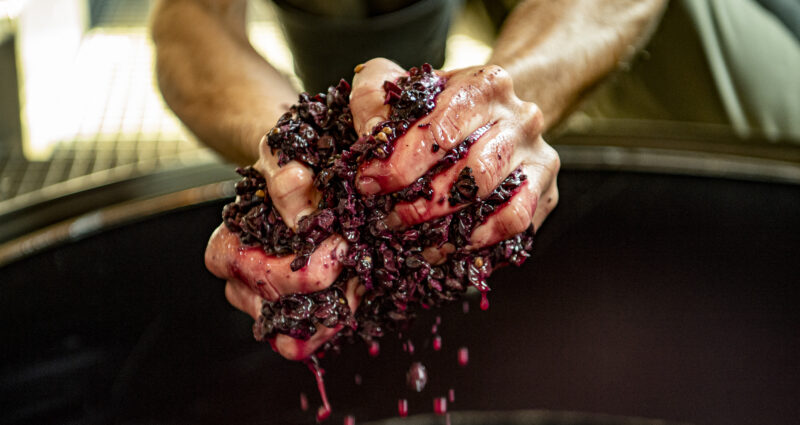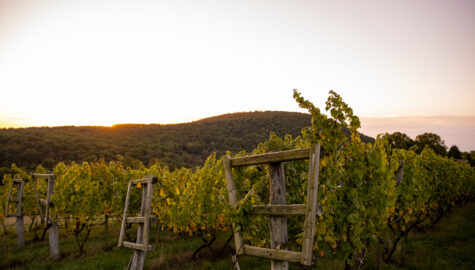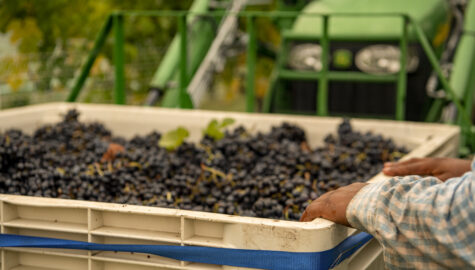
In Virginia’s wine country, history and innovation blend to create wines that reflect the true character of the land. From the early stages of grape growing to the careful craftsmanship in the cellar, Virginia’s wine industry is as diverse as it is rich.
Simplifying wine is the key to understanding the complexities of Virginia wine. By exploring the fundamentals – the different types of grapes, the vineyard’s role, and the winemaking process—it becomes easier to appreciate the unique characteristics of each bottle. With every sip, the journey from vine to glass unfolds, offering a deeper connection to the region’s vibrant wine culture.
How Wine Is Made: From Crush to Color
In earlier Wine Simplified blogs, we explored Virginia’s grape varieties and the growing cycle—from bud break in the spring to harvest in the fall. Now, we’re picking up right where the vineyard leaves off: with freshly harvested grapes heading to the winery. What happens next is where winemaking truly begins—and where decisions about style, flavor, and even color take shape.
At its core, wine is made from just a few ingredients: grapes, yeast, and time. But transforming fruit into a finished bottle involves key steps and choices that influence everything from the wine’s taste to its appearance in the glass.
Crushing & Pressing
Once grapes arrive at the winery, they’re crushed to release their juice. What happens next depends on the style of wine the winemaker wants to make:
- White wines are usually made by quickly pressing the juice away from the grape skins. This helps preserve freshness and prevents the juice from picking up color or tannins.
- Red wines are made by fermenting the juice with the grape skins. This contact allows the wine to extract color, flavor compounds, and structure (like tannins) from the skins.
- Rosé wines are made using red grapes, but the skins stay in contact with the juice for only a short time—just enough to give the wine its signature pink color.
Fermentation
With the juice prepared, yeast (either naturally occurring or added by the winemaker) begins to convert the grape’s natural sugars into alcohol. This process usually takes several days to a few weeks. Temperature, vessel type (like stainless steel or oak), and timing all play a role in shaping the wine’s final character.
Aging
After fermentation, wine often needs time to settle and mature. Some wines are aged in stainless steel to preserve crispness, while others rest in oak barrels to develop additional complexity. The aging period can last just a few months or extend for years, depending on the style and the winemaker’s intent.
Blending
Many Virginia wines are blends, reflecting the state’s experimental and adaptive winemaking. Thanks to the state’s dynamic climate and wide range of soil types, winemakers often craft blends to create wines that are greater than the sum of their parts. Bordeaux-style blends, in particular, are a hallmark of the region, showcasing grapes like Cabernet Franc, Merlot, Petit Verdot, and Cabernet Sauvignon. These blends allow winemakers to adjust for vintage variation, build complexity, and achieve harmony between structure, acidity, and fruit.
Bottling
Once the wine has reached its ideal expression, it’s optionally filtered before being bottled and labeled. While some wines are released shortly after bottling, others may benefit from more time in the bottle before they’re ready to drink. This extra time allows tannins to soften, acidity to integrate, and complex aromas and flavors to develop, enhancing the overall drinking experience.
Where Wine Gets Its Color
One of the most surprising things about wine? Almost all grape juice—whether from red or white grapes—is clear. The color of wine comes almost entirely from the grape skins.
- Red wines get their deep hues and fuller structure from extended skin contact during fermentation. Virginia reds like Petit Verdot and Norton develop their bold color and complexity this way.
- Rosé wines are pressed off the skins early, leading to lighter color and softer texture. Many Virginia rosés are crafted from grapes such as Cabernet Franc or Merlot.
- White wines are typically made without any skin contact, keeping them pale and crisp. Petit Manseng and Viognier are standout examples in the state.
So the next time you pour a glass of Virginia, whether it’s golden, ruby, or rosé, you’ll know the color tells part of the wine’s story. Visit a Virginia vineyard or find a local bottle in stores today!
More Virginia Wine Stories

May 22, 2025
Wine Simplified: Vine Growth Cycle
In Virginia’s wine country, history and innovation blend to create wines that reflect the true character of the land. From the early stages of grape growing to the careful craftsmanship […]
Read More
February 6, 2025
Wine Simplified: Virginia’s Varieties
In Virginia’s wine country, history and innovation blend to create wines that reflect the true character of the land. From the early stages of grape growing to the careful craftsmanship […]
Read More
June 12, 2025
10 Ways to Sip Local This Summer
Virginia Wine country is made for summer. Whether you’re chasing mountain views, a coastal breeze, or stumbling upon a hidden gem just outside the city, there’s a chilled glass and […]
Read More